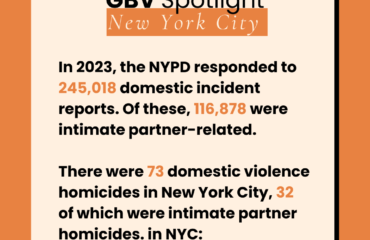Authored by: bec ritchie, NGO CSW/NY Advocacy & Admin Intern
The World Health Organization (WHO) defines intimate partner violence as ‘behaviour within an intimate relationship that causes physical, sexual or psychological harm, including acts of physical aggression, sexual coercion, psychological abuse and controlling behaviours. This definition covers violence by both current and former spouses and partners.’ Some examples provided by WHO include:
- Physical violence is when a person hurts or tries to hurt a partner by using physical force.
- Sexual violence is forcing or attempting to force a partner to take part in a sex act, sexual touching, or a non-physical sexual event (e.g., sexting) when the partner does not or cannot consent.
- Stalking is a pattern of repeated, unwanted attention and contact by a partner that causes fear or concern for one’s own safety or the safety of someone close to the victim.
- Psychological aggression is the use of verbal and non-verbal communication with the intent to harm a partner mentally or emotionally or to exert control over a partner.
The effects of intimate partner violence are grave, with women who experience such violence facing health risks (both physical and mental), injury, miscarriages and other pregnancy-related complications, and fatal outcomes like homicide or suicide. Research also notes the severe negative impact on children who grow up in environments of intimate partner violence (also considered victims of such intimate partner violence) citing mental health and behavioral issues, amongst others.
Across the globe, intimate partner violence remains the most common form of gender-based violence experienced by women. Almost one in three women have experienced physical and/or sexual violence at least once in their lifetime, and more often than not, this violence is perpetrated by current or former intimate partners. Statistically, and disturbingly, the most dangerous place for women and girls is the home.
According to a recent UN report investigating femicides committed by intimate partners and family members, approximately 51,100 women and girls globally were killed by their intimate partners or other family members in 2023. This equates to an average of 140 women each day.
While the issue remains glaring, the report stresses that femicides committed via intimate partner violence are ‘often the culmination of repeated episodes of gender-based violence, which means they are preventable through timely and effective interventions.’
Intimate partner violence can be prevented. The WHO stresses the importance of ‘promoting healthy, respectful, and nonviolent relationships and communities can help reduce the occurrence of intimate partner violence. It also can prevent the harmful and long-lasting effects of intimate partner violence on individuals, families, and communities.’
Importantly, there are many resources and organizations that those experiencing intimate partner violence and seeking help can access.
Information & Resources:


